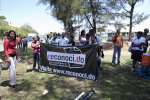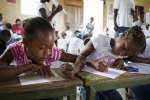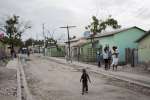- Text size
 |
|  |
|  |
| 
- Français
UNHCR calls for US$12.5 million to help quake-displaced Haitians
News Stories, 13 April 2010
GENEVA, April 13 (UNHCR) – The UN refugee agency on Tuesday called for US$12.5 million to help people living outside of formal camps in Haiti and other quake survivors who have fled to neighbouring Dominican Republic.
To date, UNHCR has been actively supporting the protection and camp management programmes set up in Haiti to help survivors of the devastating January 12 earthquake. The agency has sent emergency team members specializing in protection, logistics, registration and profiling to assist with the humanitarian effort.
Shelter material was rapidly dispatched to support around 100,000 beneficiaries. In neighbouring Dominican Republic, UNHCR was asked to lead the protection response, deploying an emergency team to work with the Dominican authorities to help Haitians evacuated there.
"UNHCR has conducted assessments to identify the needs of those displaced outside of Port-au-Prince and recognized camps," Melissa Fleming, the agency's chief spokesperson, told journalists in Geneva. "With this new appeal, UNHCR is aiming to further assist the population living outside camps, thus preventing further displacement or premature return before appropriate and safe conditions are established," she added.
During the course of this year, UNHCR and its partners hope to implement 85 quick impact projects that will target quake-displaced people who have received a lower level of humanitarian assistance than the population living in camps and in the capital, Port-au-Prince.
Twenty-five of these projects will focus on the displaced population living near the border with Dominican Republic. In addition, UNHCR will aim to support Haiti with aid for 60,000 displaced people in the border region and the West, Central and Artibonite areas.
"UNHCR will continue to support the return to Haiti of patients discharged from hospitals in the Dominican Republic and will assist vulnerable individuals who need to remain. In Santo Domingo, support will be given to churches, host families and shelters that are caring for discharged patients and vulnerable Haitians, including unaccompanied children, orphans, women at risk and the disabled," Fleming said.
The UN refugee agency and its partners will also support vulnerable third-country nationals, including refugees and undocumented migrants, who were living in Haiti at the time of the earthquake and who either fled to neighbouring Dominican Republic or became displaced in Haiti. In addition to short term humanitarian assistance, they will be offered counselling about voluntary return to their home countries or alternative durable solutions.




















